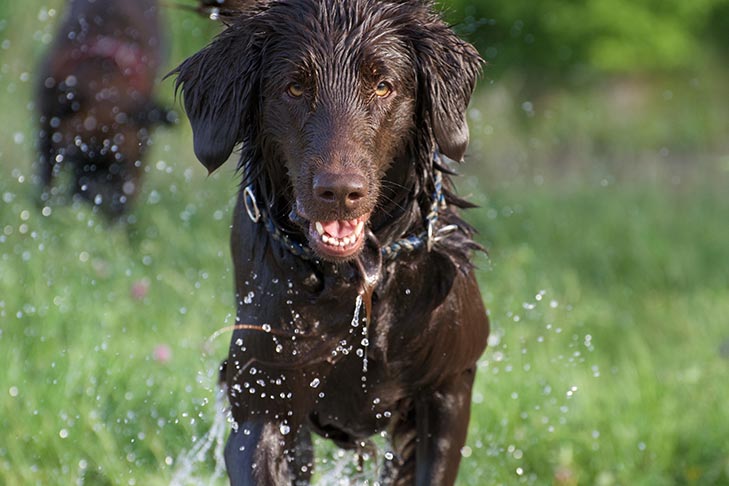
Some dogs can hardly contain their excitement when it’s time to go for a walk. As dogs explore, they may get into soil and water, and you may not realize that even those can be dangerous for your dog’s health. The microorganisms in soil and water, such as a fungus or bacterium, can make your dog sick.
Dogs who come into contact with one type of microorganism, a bacteria called Leptospira, may develop a potentially life-threatening disease called leptospirosis. Here’s what you need to know about leptospirosis, including causes, symptoms, prevention, and treatment, to keep your dog safe.
What Is Leptospirosis?
Leptospirosis in dogs is an infection caused by Leptospira, which are bacteria that target the kidneys and liver. “The bacteria are typically transmitted through contaminated water sources,” says Dr. Jamie Whittenburg, DVM. “Some strains may actually enter the body through the dog’s skin if they swim in contaminated water.” Commonly diagnosed in dogs, this disease can be fatal.
Warm and wet climates provide an ideal breeding ground for Leptospira bacteria, which are found in the kidneys of infected mice, rats, skunks, raccoons, and possums. “Since these animals are found all over the world, so is leptospirosis,” says Dr. Kelly Fishman, DVM. “The excreted bacteria can survive in water, mud, and urine for extended periods of time.”

Dogs can get sick from ingesting infected water. Alternatively, they might get sick if an open wound is exposed to contaminated water. Dogs can also contract leptospirosis if they’re bitten by an infected animal or consume tissue from an infected animal’s body. It is also possible that a female dog can transmit leptospirosis via her placenta to her puppies.
But dogs aren’t the only ones at risk. Leptospirosis is a zoonotic disease, meaning it’s caused by exposure to harmful germs that animals can spread to humans. People may contract leptospirosis by coming into contact with an infected dog’s urine or other bodily fluids (except saliva) or coming into contact with food, water, or soil contaminated with infected urine. To avoid contracting leptospirosis, wear disposable plastic gloves while handling items that have come into contact with dog urine, and wash your hands thoroughly after.
What are the Symptoms of Leptospirosis?
According to the American Veterinary Medical Association (AVMA), signs of leptospirosis in dogs may include:
- Lethargy
- Poor appetite
- Tender muscles
- Urinating more or less than usual
- Dehydration
- Diarrhea
- Vomiting
- Fever
- Shivering
- Not wanting to move
- Painful swelling in the eye area
- Being thirstier than usual
- Jaundiced or yellow appearance to the dog’s eyes, skin, and gums
- Blood in urine or feces, or appearing as small bruises on the dog’s skin and whites of their eyes (sometimes)

In most dogs, your vet may see some of these symptoms, as well as increased renal values (when levels of certain substances in your dog’s kidneys are elevated). In many (but not all) dogs, your vet may see increased hepatic (liver) values. Fluid may also gather in your dog’s body, causing body parts like the legs to swell.
Not all dogs show signs of illness after becoming infected with Leptospira bacteria, Dr. Fishman says. And even once they do show ill effects, the immediate cause may not be apparent since fever and lethargy can be clinical signs of other illnesses. Typically, Dr. Fishman says that dog owners will see that their dog isn’t feeling or acting normal with low energy, like refusing to eat, eating less, or vomiting.
How Is Leptospirosis in Dogs Diagnosed?
If you notice these behaviors in your dog, contact your veterinarian at once. Your vet will record a thorough history of your dog’s health, including their vaccination status, and they will conduct routine bloodwork to look for elevated liver and kidney enzymes. Even if your dog has been vaccinated against leptospirosis, your vet will recommend testing to rule out infection, Dr. Fishman says.
Specialized tests are required to check for the presence of bacteria in your dog’s blood or urine. “Most commonly, this will be a PCR — polymerase chain reaction — test that will be sent out to a medical laboratory to look for the presence of genetic material from the Leptospira bacteria in the blood or urine,” Dr. Whittenburg says. “A different test, the microscopic agglutination test, detects antibodies to the disease.”
Leptospirosis can affect dogs of any age, breed, sex, or size. Historically, this disease was more common among medium and large rural and performance sporting dogs that had “greater exposure to wildlife and contaminated water and mud,” Dr. Fishman says. But all dogs can potentially contract leptospirosis. For example, pets that live in densely populated areas might become infected if they frequent outdoor spaces contaminated with the urine of rodents or livestock, Dr. Whittenburg adds.
Preventing Leptospirosis in Dogs
Leptospirosis is most common in areas that are warm and wet, but recently, there have been leptospirosis outbreaks around the world and in American cities like New York, Chicago, Detroit, Dallas, and Fort Worth.
While there are no specific dog breeds that are genetically predisposed to contracting leptospirosis, some dogs may be more susceptible because of their age, poor vaccination history, and health status, Dr. Fishman says.

In addition, other factors can put dogs at risk of becoming infected, including:
- Sniffing and licking other dogs’ urine
- Residing in cities and rural areas with high rainfall and flooding (where dogs might be exposed to stagnant water), especially if there is a high rodent population
- Living in geographic regions that have high case numbers
- Spending time outside in the summer and fall, when temperatures are high and provide optimal conditions for bacteria to reproduce
- Being around stagnant natural water sources that could be potentially contaminated with the urine of infected wildlife, livestock, or rodents
Dogs will likely be outside at some point, regardless of where you live. So it’s a good idea to avoid exposing them to stagnant water or potentially contaminated natural water sources. Try to curb them from excessively sniffing or licking other dogs’ pee spots, and thoroughly disinfect outdoor spaces where animals tend to urinate. Consider looking into controlling your local rodent and raccoon populations. And if you suspect your dog might have been exposed to another animal infected with leptospirosis, consult your vet immediately.
Canine Leptospirosis Vaccine
It’s important to talk to your veterinarian about risk factors to determine whether your dog should be vaccinated against leptospirosis. “In many areas of the country with a high prevalence of the disease, vaccination is considered core,” Dr. Whittenburg says. The vaccine is administered in puppies over 12 weeks and once a year in adult dogs. According to the American Veterinary Medical Association (AVMA), the vaccine remains effective for 12 months.
The vaccine for leptospirosis has been around since the 1980s. In the past, Dr. Fishman explains, vets didn’t always recommend vaccination for all dogs. “Since rural and working dogs were thought to be the ones most at risk.” However, she adds, “recent outbreaks in cities have changed our understanding of which dogs are at risk, and vet schools and the CDC recommend that all dogs be vaccinated to prevent severe illness and death.” Even if your pet has previously contracted leptospirosis, the vaccine can still help, since there are numerous strains of the disease.

Treating Leptospirosis in Dogs
Contracting leptospirosis can lead to serious illness and even death. “The earlier treatment is started, the better the dog’s chance for survival,” Dr. Whittenburg says.
If your dog becomes seriously ill, they may require hospitalization and aggressive treatment consisting of antibiotics, fever-reducing medications, intravenous fluids, and nutritional support, she explains. Continuing with antibiotics long-term (as prescribed by your vet) can ensure that the infection clears and your dog does not become a carrier for leptospirosis.
Once your dog is eating and drinking well, they can return home and begin a course of oral antibiotics. Dr. Fishman recommends that any other dogs living in the home be treated for leptospirosis to avoid spreading the disease.

